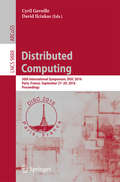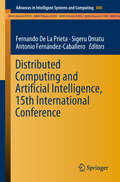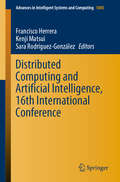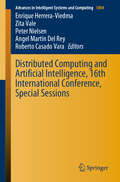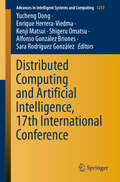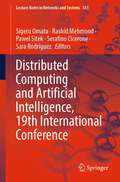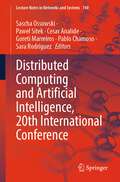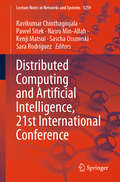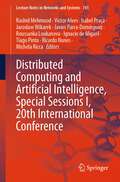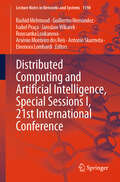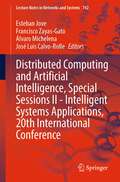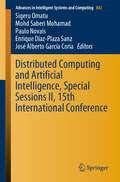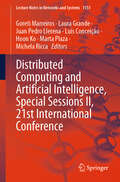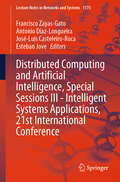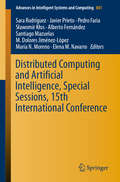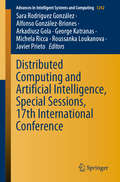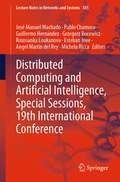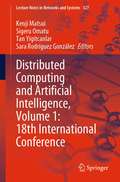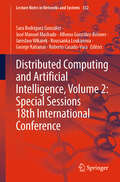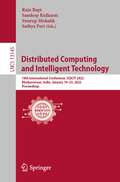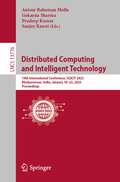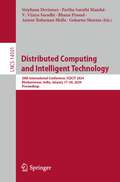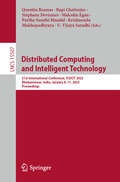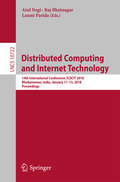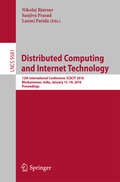- Table View
- List View
Distributed Computing
by Cyril Gavoille David IlcinkasThis book constitutes the proceedings of the 30th International Symposium on Distributed Computing, DISC 2016, held in Paris, France, in September 2016. The 32 full papers, 10 brief annoucements and 3 invited lectures presented in this volume were carefully reviewed and selected from 145 submissions. The focus of the conference is on following topics: theory, design, implementation, modeling, analysis, or application of distributed systems and networks.
Distributed Computing and Artificial Intelligence, 15th International Conference (Advances in Intelligent Systems and Computing #800)
by Antonio Fernández-Caballero Fernando De La Prieta Sigeru OmatuThe 15th International Symposium on Distributed Computing and Artificial Intelligence 2018 (DCAI 2018) is a forum to present applications of innovative techniques for studying and solving complex problems. The exchange of ideas between scientists and technicians from both the academic and industrial sector is essential to facilitate the development of systems that can meet the ever-increasing demands of today’s society. The present edition brings together past experience, current work and promising future trends associated with distributed computing, artificial intelligence and their application in order to provide efficient solutions to real problems.This symposium is organized by the University of Castilla-La Mancha, the Osaka Institute of Technology and the University of Salamanca. The present edition was held in Toledo, Spain, from 20th – 22nd June, 2018.
Distributed Computing and Artificial Intelligence, 16th International Conference (Advances in Intelligent Systems and Computing #1003)
by Francisco Herrera Sara Rodríguez-González Kenji MatsuiThis book features the outcomes of the 16th International Conference on Distributed Computing and Artificial Intelligence 2019 (DCAI 2019), which is a forum to present applications of innovative techniques for studying and solving complex problems in artificial intelligence and computing. The exchange of ideas between scientists and technicians from both the academic and industrial sectors is essential to facilitate the development of systems that can meet the ever-increasing demands of today’s society. This book brings together lessons learned, current work and promising future trends associated with distributed computing, artificial intelligence and their application to provide efficient solutions to real-world problems.The book includes 29 high-quality and diverse contributions in established and emerging areas of research presented at the symposium organized by the Osaka Institute of Technology, Hiroshima University, University of Granada and University of Salamanca, which was held in Ávila, Spain, from 26th–28th June 2019
Distributed Computing and Artificial Intelligence, 16th International Conference, Special Sessions (Advances in Intelligent Systems and Computing #1004)
by Zita Vale Enrique Herrera-Viedma Peter Nielsen Angel Martin Del Rey Roberto Casado VaraThis book presents the outcomes of the special sessions of the 16th International Conference on Distributed Computing and Artificial Intelligence 2019, a forum that brought together ideas, projects and lessons associated with distributed computing and artificial intelligence, and their applications in various areas. Artificial intelligence is currently transforming our society. Its application in distributed environments, such as the internet, electronic commerce, environmental monitoring, mobile communications, wireless devices, and distributed computing, to name but a few, is continuously increasing, making it an element of high added value and tremendous potential. These technologies are changing constantly as a result of the extensive research and technical efforts being pursued at universities and businesses alike. The exchange of ideas between scientists and technicians from both the academic and industrial sectors is essential to facilitating the development of systems that can meet the ever-growing demands of today’s society. This year’s technical program was characterized by high quality and diversity, with contributions in both well-established and evolving areas of research. More than 120 papers were submitted to the main and special sessions tracks from over 20 different countries (Algeria, Angola, Austria, Brazil, Colombia, France, Germany, India, Italy, Japan, the Netherlands, Oman, Poland, Portugal, South Korea, Spain, Thailand, Tunisia, the United Kingdom and United States), representing a truly “wide area network” of research activity. The symposium was jointly organized by the Osaka Institute of Technology and the University of Salamanca. This year’s event was held in Avila, Spain, from 26th to 28th June, 2019. The authors wish to thank the sponsors: the IEEE Systems Man and Cybernetics Society, Spain Section Chapter and the IEEE Spain Section (Technical Co-Sponsor), IBM, Indra, Viewnext, Global Exchange, AEPIA, APPIA and AIR institute.
Distributed Computing and Artificial Intelligence, 17th International Conference (Advances in Intelligent Systems and Computing #1237)
by Yucheng Dong Kenji Matsui Enrique Herrera-Viedma Sara Rodríguez González Shigeru Omatsu Alfonso González BrionesThis book brings together past experience, current work and promising future trends associated with distributed computing, artificial intelligence and their application in order to provide efficient solutions to real problems. DCAI 2020 is a forum to present applications of innovative techniques for studying and solving complex problems in artificial intelligence and computing areas. This year’s technical program will present both high quality and diversity, with contributions in well-established and evolving areas of research. Specifically, 83 papers were submitted to main track and special sessions, by authors from 26 different countries representing a truly “wide area network” of research activity. The DCAI’20 technical program has selected 35 papers and, as in past editions, it will be special issues in ranked journals. This symposium is organized by the University of L'Aquila (Italy). We would like to thank all the contributing authors, the members of the Program Committee and the sponsors (IBM, Armundia Group, EurAI, AEPIA, APPIA, CINI, OIT, UGR, HU, SCU, USAL, AIR Institute and UNIVAQ).
Distributed Computing and Artificial Intelligence, 19th International Conference (Lecture Notes in Networks and Systems #583)
by Sara Rodríguez Rashid Mehmood Sigeru Omatu Pawel Sitek Serafino CiceroneDCAI 2022 is a forum to present applications of innovative techniques for studying and solving complex problems in artificial intelligence and computing areas. The present edition brings together past experience, current work and promising future trends associated with distributed computing, artificial intelligence and their application in order to provide efficient solutions to real problems. This year’s technical program will present both high quality and diversity, with contributions in well-established and evolving areas of research. Specifically, 61 papers were submitted, by authors from 28 different countries representing a truly “wide area network” of research activity. The DCAI’22 technical program has selected 32 full papers and, as in past editions, it will be special issues in ranked journals. This symposium is organized by the University of L'Aquila (Italy). We would like to thank all the contributing authors, the members of the Program Committee and the sponsors (IBM, Indra, Dipartimento di Ingegneria e Scienze dell'Informazione e Matematica dell'Università degli Studi dell'Aquila, Armundia Group, Whitehall Reply, T.C. Technologies And Comunication S.R.L., LCL Industria Grafica, AIR Institute, AEPIA, APPIA).
Distributed Computing and Artificial Intelligence, 20th International Conference (Lecture Notes in Networks and Systems #740)
by Sascha Ossowski Cesar Analide Sara Rodríguez Goreti Marreiros Pablo Chamoso Pawel SitekThe present book brings together experience, current work, and promising future trends associated with distributed computing, artificial intelligence, and their application in order to provide efficient solutions to real problems. DCAI 2023 is a forum to present applications of innovative techniques for studying and solving complex problems in artificial intelligence and computing areas. This year’s technical program presents both high quality and diversity, with contributions in well-established and evolving areas of research. Specifically, 108 papers were submitted, by authors from 31 different countries representing a truly “wide area network” of research activity. The DCAI 23 technical program has selected 36 full papers in the main track and, as in past editions, there will be special issues in ranked journals. This symposium is organized by the LASI and Centro Algoritmi of the University of Minho (Portugal). The authors like to thank all the contributing authors, the members of the Program Committee, National Associations (AEPIA, APPIA), and the sponsors (AIR Institute).
Distributed Computing and Artificial Intelligence, 21st International Conference (Lecture Notes in Networks and Systems #1259)
by Sascha Ossowski Sara Rodríguez Kenji Matsui Pawel Sitek Ravikumar Chinthaginjala Nasro Min-AllahThis book serves as a forum to present applications of innovative techniques for studying and solving complex problems in artificial intelligence and computing. This edition brings together experience, current work, and promising future trends related to distributed computing, artificial intelligence, and their applications to provide efficient solutions to real-world problems. The technical program this year is both high in quality and diverse, featuring contributions from well-established and evolving research areas. Specifically, 138 papers were submitted by authors from 43 different countries, representing a truly global network of research activity. The DCAI’24 technical program has selected 36 full papers for the main track, and as in previous editions, there will be special issues in ranked journals. This symposium is organized by the University of Salamanca (Spain). The authors would like to thank all the contributing authors, the program committee members, National Associations (AEPIA, APPIA, LASI), and the sponsors (AIR Institute).
Distributed Computing and Artificial Intelligence, Special Sessions I, 20th International Conference (Lecture Notes in Networks and Systems #741)
by Ricardo Nunes Tiago Pinto Rashid Mehmood Roussanka Loukanova Michela Ricca Isabel Praça Victor Alves Jarosław Wikarek Javier Parra-Domínguez Ignacio De MiguelThe present book brings together experience, current work, and promising future trends associated with distributed computing, artificial intelligence, and their application in order to provide efficient solutions to real problems. DCAI 2023 is a forum to present applications of innovative techniques for studying and solving complex problems in artificial intelligence and computing areas. This year’s technical program presents both high quality and diversity, with contributions in well-established and evolving areas of research. Specifically, 108 papers were submitted, by authors from 31 different countries representing a truly “wide area network” of research activity. The DCAI’23 technical program has selected 50 full papers in the Special Sessions (ASET, AIMPM, AI4CS, CLIRAI, TECTONIC, PSO-ML, SmartFoF, IoTalentum) and, as in past editions, it will be special issues in ranked journals. This symposium is organized by the LASI and Centro Algoritmi of the University of Minho (Portugal). The authors like to thank all the contributing authors, the members of the Program Committee, National Associations (AEPIA, APPIA), and the sponsors (AIR Institute).
Distributed Computing and Artificial Intelligence, Special Sessions I, 21st International Conference (Lecture Notes in Networks and Systems #1198)
by Antonio Skarmeta Rashid Mehmood Roussanka Loukanova Isabel Praça Jaroslaw Wikarek Guillermo Hernández Arsénio Monteiro dos Reis Eleonora LombardiThis book presents applications of innovative techniques for studying and solving complex problems in artificial intelligence and computing. This edition brings together experience, current work, and promising future trends related to distributed computing, artificial intelligence, and their applications to provide efficient solutions to real-world problems. Given the conference's success, this edition features twelve special sessions covering a wide range of topics related to AI and other areas of interest. These sessions were carefully curated to address the latest advancements and challenges in fields such as machine learning, neural networks, IoT, big data, and blockchain, among others. The accepted papers from these sessions are presented in two volumes, showcasing the diverse and innovative research being conducted in these domains. This is the first volume, which includes the sessions: Artificial intelligence for enhanced cyber security (AI4CS), AI-driven methods for multimodal networks and processes modeling (AIMPM), computational linguistics, information, reasoning, and AI (CLIRAI), novel technologies for smart industry and mobility (SmartMob), intelligent Internet of things security and privacy (WISP) and revolutionizing carbon farming by nature-based business models and emerging innovations in the field of artificial intelligence, satellite and green technologies (INNO4CFIS), each focusing on specific themes within the broader scope of AI and its applications. The DCAI’24 technical program has selected 74 papers in special sessions and, as in past editions, it will be special issues in ranked journals. This symposium is organized by the University of Salamanca (Spain). The authors would like to thank all the contributing authors, the program committee members, national associations (AEPIA, APPIA, LASI), and the sponsors (AIR Institute).
Distributed Computing and Artificial Intelligence, Special Sessions II - Intelligent Systems Applications, 20th International Conference (Lecture Notes in Networks and Systems #742)
by Esteban Jove Francisco Zayas-Gato Álvaro Michelena José Luis Calvo-RolleThis book of LNNS contains accepted papers presented at DCAI conference in the Special Session on Intelligent Systems Applications (ISA), Guimarães (Portugal), July 2023. ISA is a major forum for presentation of development and applications of innovative techniques in the fields of building management, assistive technologies, the applied engineering, and industry. The scientific committee of the ISA has selected 8 full papers for its publication. This year ISA Special Session has teamed up with “Logic Journal of the IGPL” (Oxford University Press) for one special issue including selected papers from ISA Special Session 2023. We would like to thank all the contributing authors, the members of the Program Committee, the Organizing Committee of the Universities of Minho, and Salamanca for their hard and highly valuable work, which has been essential for the success of ISA 2023.
Distributed Computing and Artificial Intelligence, Special Sessions II, 15th International Conference (Advances in Intelligent Systems and Computing #802)
by Paulo Novais Mohd Saberi Mohamad Sigeru Omatu Enrique Díaz-Plaza Sanz José Alberto García CoriaThis book addresses a broad range of topics, from newly proposed techniques in Artificial Intelligence (AI) and Machine Learning to various applications such as decision-making, pattern classification for data, image and signals, robotics, and control systems. Big data applications are discussed, while improved methods and wholly new methods for using deep learning technologies are also presented. The topics covered are comprehensive and reflect a wide range of technologies in the area. In particular, the latest methods in deep learning approaches and applications are discussed in many parts of the book, providing a better understanding of these new technologies. The book’s general scope includes the latest methods in the areas of Artificial Intelligence and Machine Learning for use in distributed computing as well as decision support systems. As the book covers a rather wide area, its intended readership ranges from those working in AI and machine learning technologies to those working on applications utilizing these technologies, researchers new to these areas who need background information on the technologies and applications, and more experienced researchers looking for new methods and applications.
Distributed Computing and Artificial Intelligence, Special Sessions II, 21st International Conference (Lecture Notes in Networks and Systems #1151)
by Goreti Marreiros Michela Ricca Laura Grande Juan Pedro Llerena Luís Conceição Hoon Ko Marta PlazaDCAI 2024 serves as a forum to present applications of innovative techniques for studying and solving complex problems in artificial intelligence and computing. This edition brings together experience, current work, and promising future trends related to distributed computing, artificial intelligence, and their applications to provide efficient solutions to real-world problems. Given the conference's success, this edition features twelve special sessions covering a wide range of topics related to AI and other areas of interest. These sessions were carefully curated to address the latest advancements and challenges in fields such as machine learning, neural networks, IoT, big data, and blockchain, among others. The accepted papers from these sessions are presented in two volumes, showcasing the diverse and innovative research being conducted in these domains. This is the first volume, which includes the sessions: Advanced AI-based Data Annotation Tools (AI-DAT), Digital Heritage Contents (DHC), female technopreneurs and early career researchers in distributed computing and AI organised by the Gendered Innovation Living Labs (GILL), New perspectives and solutions in Cultural Heritage (TECTONIC), Artificial Intelligence trends in Health & Care (AItHeC) & Doctoral Consortiums), each focusing on specific themes within the broader scope of AI and its applications. The DCAI’24 technical program has selected 74 papers in special sessions and, as in past editions, it will be special issues in ranked journals. This symposium is organized by the University of Salamanca (Spain). We would like to thank all the contributing authors, the Program Committee members, National Associations (AEPIA, APPIA, LASI), and the sponsors (AIR Institute).
Distributed Computing and Artificial Intelligence, Special Sessions III - Intelligent Systems Applications, 21st International Conference (Lecture Notes in Networks and Systems #1173)
by Esteban Jove Francisco Zayas-Gato Antonio Díaz-Longueira José-Luis Casteleiro-RocaThis volume of LNNS contains accepted papers presented at DCAI conference in the Special Session on Intelligent Systems Applications (ISA), Salamanca (Spain), June 2024. ISA is a major forum for presentation of development and applications of innovative techniques in the fields of building management, assistive technologies, the applied engineering, and industry. The scientific committee of the ISA has selected 9 full papers for its publication. This year ISA Special Session has teamed up with “Logic Journal of the IGPL” (Oxford University Press) for one special issue including selected papers from ISA Special Session 2024. We would like to thank all the contributing authors, National Associations (AEPIA, APPIA), and sponsors (AIR Institute). Finally, we are grateful and value the hard work of the Program Committee members and the Organizing Committee of the University of Salamanca which has been essential for the success of the ISA Special Session 2024.
Distributed Computing and Artificial Intelligence, Special Sessions, 15th International Conference (Advances in Intelligent Systems and Computing #801)
by Sara Rodríguez María N. Moreno Alberto Fernández Pedro Faria Javier Prieto Sławomir Kłos Santiago Mazuelas M. Dolores Jiménez-López Elena M. NavarroThis book presents the outcomes of the 15th International Conference on Distributed Computing and Artificial Intelligence, held in Toledo (Spain) from 20th to 22nd June 2018 and hosted by the UCLM, and which brought together researchers and developers from industry, education and the academic world to report on the latest scientific research, technical advances and methodologies. Highlighting multi-disciplinary and transversal aspects, the book focuses on the conferences Special Sessions, including Advances in Demand Response and Renewable Energy Sources in Smart Grids (ADRESS); AI- Driven Methods for Multimodal Networks and Processes Modeling (AIMPM); Social Modelling of Ambient Intelligence in Large Facilities (SMAILF); Communications, Electronics and Signal Processing (CESP); Complexity in Natural and Formal Languages (CNFL); and Web and Social Media Mining (WASMM).
Distributed Computing and Artificial Intelligence, Special Sessions, 17th International Conference (Advances in Intelligent Systems and Computing #1242)
by Javier Prieto Alfonso González-Briones Roussanka Loukanova Sara Rodríguez González Arkadiusz Gola George Katranas Michela RiccaThis book brings together past insights, current research and promising future trends associated with distributed computing, artificial intelligence and their application in order to provide efficient solutions to real-world problems. The book is based on the International Conference on Distributed Computing and Artificial Intelligence 2020 (DCAI 2020), which provided a forum to present applications of innovative techniques for studying and solving complex problems in artificial intelligence and computing areas. It includes contributions on well-established and evolving areas of research, by authors from 26 countries, representing a truly “wide area network” of research activity
Distributed Computing and Artificial Intelligence, Special Sessions, 19th International Conference (Lecture Notes in Networks and Systems #585)
by Pablo Chamoso Grzegorz Bocewicz Roussanka Loukanova Michela Ricca José Manuel Machado Guillermo Hernández Esteban Jove Angel Martin del ReyDCAI 2022 is a forum to present applications of innovative techniques for studying and solving complex problems in artificial intelligence and computing areas. The present edition brings together past experience, current work and promising future trends associated with distributed computing, artificial intelligence and their application in order to provide efficient solutions to real problems. This year’s technical program will present both high quality and diversity, with contributions in well-established and evolving areas of research. Specifically, 46 papers were submitted, by authors from 28 different countries representing a truly “wide area network” of research activity. The DCAI’22 Special Sessions technical program has selected 22 papers (12 full papers) and, as in past editions, it will be special issues in ranked journals. This symposium is organized by the University of L'Aquila (Italy). We would like to thank all the contributing authors, the members of the Program Committee and the sponsors (IBM, Indra, Dipartimento di Ingegneria e Scienze dell'Informazione e Matematica dell'Università degli Studi dell'Aquila, Armundia Group, Whitehall Reply, T.C. Technologies And Comunication S.R.L., LCL Industria Grafica, AIR Institute, AEPIA, APPIA).
Distributed Computing and Artificial Intelligence, Volume 1: 18th International Conference (Lecture Notes in Networks and Systems #327)
by Sigeru Omatu Tan Yigitcanlar Kenji Matsui Sara Rodríguez GonzálezThis book offers the exchange of ideas between scientists and technicians from both the academic and industrial sector which is essential to facilitate the development of systems that can meet the ever-increasing demands of today’s society. The 18th International Symposium on Distributed Computing and Artificial Intelligence 2021 (DCAI 2021) is a forum to present the applications of innovative techniques for studying and solving complex problems in artificial intelligence and computing areas. The present edition brings together past experience, current work, and promising future trends associated with distributed computing, artificial intelligence, and their application in order to provide efficient solutions to real problems. This year’s technical program presents both high quality and diversity, with contributions in well-established and evolving areas of research. Specifically, 55 papers were submitted to main track and special sessions, by authors from 24 different countries, representing a truly “wide area network” of research activity. The DCAI’21 technical program has selected 21 papers, and, as in past editions, it will be special issues in ranked journals such as Electronics, Sensors, Systems, Robotics, Mathematical Biosciences and ADCAIJ. These special issues cover extended versions of the most highly regarded works. Moreover, DCAI'21 special sessions have been a very useful tool to complement the regular program with new or emerging topics of particular interest to the participating community.
Distributed Computing and Artificial Intelligence, Volume 2: Special Sessions 18th International Conference (Lecture Notes in Networks and Systems #332)
by Alfonso González-Briones Roussanka Loukanova Roberto Casado-Vara Sara Rodríguez González George Katranas José Manuel Machado Jaroslaw WikarekThis book highlights the latest research on distributed computing and artificial intelligence. DCAI 2021 is a forum to present applications of innovative techniques for studying and solving complex problems in artificial intelligence and computing areas. The present edition brings together past experience, current work and promising future trends associated with distributed computing, artificial intelligence and their application in order to provide efficient solutions to real problems. This year’s technical program will present both high quality and diversity, with contributions in well-established and evolving areas of research. Specifically, 55 papers were submitted to main track and special sessions, by authors from 24 different countries representing a truly “wide area network” of research activity. Moreover, DCAI 2021 Special Sessions have been a very useful tool in order to complement the regular program with new or emerging topics of particular interest to the participating community. The technical program of the Special Sessions of DCAI 2021 has selected 23 papers. We would like to thank all the contributing authors, the members of the Program Committees, the sponsors (IBM, Armundia Group, EurAI, AEPIA, APPIA, CINI, OIT, UGR, HU, SCU, USAL, AIR Institute and UNIVAQ) and the Organizing Committee of the University of Salamanca for their hard and highly valuable work.
Distributed Computing and Intelligent Technology: 18th International Conference, ICDCIT 2022, Bhubaneswar, India, January 19–23, 2022, Proceedings (Lecture Notes in Computer Science #13145)
by Raju Bapi Sandeep Kulkarni Swarup Mohalik Sathya PeriThis book constitutes the proceedings of the 18th International Conference on Distributed Computing and Intelligent Technology, ICDCIT 2022, held in Bhubaneswar, India, in January 20212. The 11 full papers presented together with 4 short papers were carefully reviewed and selected from 50 submissions. There are also 4 invited papers included. The papers were organized in topical sections named: invited papers, distributed computing and intelligent technology.
Distributed Computing and Intelligent Technology: 19th International Conference, ICDCIT 2023, Bhubaneswar, India, January 18–22, 2023, Proceedings (Lecture Notes in Computer Science #13776)
by Pradeep Kumar Anisur Rahaman Molla Gokarna Sharma Sanjay RawatThis book constitutes the proceedings of the 19th International Conference on Distributed Computing and Intelligent Technology, ICDCIT 2023, which was held in Bhubaneswar, India, in January 2023.The 20 full papers and 9 short papers presented in this volume were carefully reviewed and selected from 55 submissions. The papers are organized in the following topical sections: Invited Talks; Distributed Computing; Intelligent Technology.
Distributed Computing and Intelligent Technology: 20th International Conference, ICDCIT 2024, Bhubaneswar, India, January 17–20, 2024, Proceedings (Lecture Notes in Computer Science #14501)
by Bhanu Prasad Stéphane Devismes Anisur Rahaman Molla Gokarna Sharma Partha Sarathi Mandal V. Vijaya SaradhiThis book constitutes the refereed proceedings of the 20th International Conference on Distributed Computing and Intelligent Technology, ICDCIT 2024, which was held in Bhubaneswar, India, during January 17–20, 2024. The 24 full papers presented in this volume were carefully reviewed and selected from 116 submissions. The papers are organized in the following topical sections: Distributed Computing (DC) and Intelligent Technology (IT). The DC track solicits original research papers contributing to the foundations and applications of distributed computing, whereas the IT track solicits original research papers contributing to the foundations and applications of Intelligent Technology.
Distributed Computing and Intelligent Technology: 21st International Conference, ICDCIT 2025, Bhubaneswar, India, January 8–11, 2025, Proceedings (Lecture Notes in Computer Science #15507)
by Krishnendu Mukhopadhyaya Stéphane Devismes Partha Sarathi Mandal V. Vijaya Saradhi Quentin Bramas Bapi Chatterjee Malcolm EganThis volume LNCS constitutes the refereed proceedings of the 21st International Conference on Distributed Computing and Intelligent Technology, ICDCIT 2025, in Bhubaneswar, in India, in January 2025. ICDCIT is organized into two tracks: Distributed Computing (DC) and Intelligent Technology (IT). The DC track solicits original research papers contributing to the foundations and applications of distributed computing. The DC track PC accepted 10 papers (7 regular papers and 3 short papers), and the IT track PC accepted 8 regular papers, The conference presents and discusses results and ideas on the foundations and applications of distributed computing and intelligent technology.
Distributed Computing and Internet Technology
by Laxmi Parida Atul Negi Raj BhatnagarThis book constitutes the proceedings of the 13th International Conference on Distributed Computing and Internet Technology, ICDCIT 2017, held in Bhubaneswar, India, in January 2017. The 17 full papers and 3 poster papers presented together with 6 abstracts of invited talks were carefully reviewed and selected from 208 submissions (118 abstract and 90 full paper submissions). The ICDCIT conference focusses on mobile computing; analytics; distributed computing; virtual machines; access control; and security and privacy.
Distributed Computing and Internet Technology
by Nikolaj Bjørner Sanjiva Prasad Laxmi ParidaThis bookconstitutes the proceedings of the 12th International Conference on DistributedComputing and Internet Technology, ICDCIT 2016, held in Bhubaneswar, India, inJanuary 2016. The 6 fullpapers, 7 short papers and 11 poster papers presented in this volume werecarefully reviewed and selected from 129 submissions. The ICDCIT conferencefocusses on distributed computing, internet technologies, and societalapplications. The book also contains 3 full paper invited talks.
